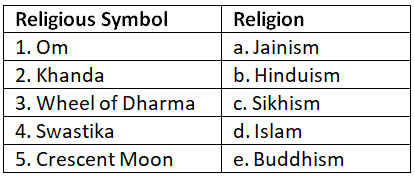Worksheet: Religions in India | General Knowledge for Young Learners - Class 1 PDF Download
Section A: Fill in the Blanks
Q1: Buddhism was founded by __________.
Q2: Hinduism has many gods and goddesses. One of the most important gods is __________.
Q3: In Sikhism, the holy book is called __________.
Q4: Jainism was founded by __________.
Q5: Diwali is a festival celebrated by Hindus to mark the return of __________.
Q6: The sacred river in Hinduism is the __________.
Q7: The first Guru of Sikhism was __________.
Q8: The pilgrimage to Mecca is known as __________.
Q9: In Jainism, the term for non-violence is __________.
Q10: The main religious text of Hinduism is called __________.
Section B: Match the Column

Section C: True or False
Q1: The founder of Buddhism is Siddhartha Gautama.
Q2: Hinduism is monotheistic, believing in only one god.
Q3: Sikhism originated in the country of Nepal.
Q4: Jainism promotes non-violence and respect for all living beings.
Q5: Islam is monotheistic
You can access the solutions to this worksheet here.
|
52 videos|107 docs|40 tests
|
FAQs on Worksheet: Religions in India - General Knowledge for Young Learners - Class 1
| 1. What are the major religions practiced in India? |  |
| 2. How does Hinduism influence Indian culture? |  |
| 3. What is the significance of festivals in Indian religions? |  |
| 4. Are there any common practices among different religions in India? |  |
| 5. How does the Indian Constitution protect religious diversity? |  |
















